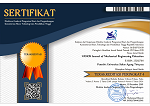PARTNERSHIP MODEL AS EMPOWERMENT BETWEEN VOCATIONAL SCHOOLS AND BUSINESS WORLD/INDUSTRIAL WORLD
Abstract
This study aims to find a model of vocational partnership development with Business World (BW)/Industrial World (IW) that is suitable to be applied in Indonesia. The model that bridges the partnership relationship between vocational schools and BW/IW is developed based on factual conditions in the field, existing theoretical models and focuses on the concept of link and match between the relevant institutions. Vocational school discussion forums and BW/IW are held as a means of brainstorming between stakeholders. Data collection through open questionnaires is used to hear directly the opinions of stakeholders regarding the expected partnership model. The basis of the model which is used as the basis of the foundation is industrial training, Dual System Education (DSE), Teaching Factory and Work Based Learning. The Vocational School in general provides information on cooperation undertaken which requires open recruitment standards to enter the BW/IW which are clear, legal umbrella regulations from the government. The following models are produced by Industrial cooperation with Vocational Schools, the cooperation model includes three aspects: 1) the needs in BW/IW, 2) the regional ecosystems produced by BW/IW with vocational schools, and 3) the needs of the vocational schools learning process.
Keywords
Full Text:
PDFReferences
Adebisi, T. A. and Oni, C. S. (2012) ‘Availability of vocational training facilities for the National Directorate of Employment ( NDE ) in Nigeria’, International Journal of Development and Sustainability, 1(3), pp. 1–14. Available at:https://pdfs.semanticscholar.org/ca17/ecd16bfb6797405c1547bd21967711547ee0.pdf.
Arif Bintoro Johan, Slamet PH dan Widodo. (2019). Evaluation of Education Implementation Of Link And Match Systems of The Industrial And Vocational School In Yogyakarta Province. Jurnal Taman Vokasi. akses: http://jurnal.ustjogja.ac.id/index.php/tamanvokasi/article/view/7070
Ali, M. (2009) Pendidikan untuk pembangunan nasional: menuju bangsa Indonesia yang mandiri dan berdaya saing tinggi. Bandung: Imtima.
Billett, S. (2013) ‘The standing of vocational education : sources of its societal esteem and implications for its enactment’, Journal of Vocational Education & Training, 66(1), pp. 1–21. doi: 10.1080/13636820.2013.867525.
BPS (2020) Keadaan Ketenagakerjaan Indonesia Februari 2020. Jakarta. Available at: https://www.bps.go.id/pressrelease/2020/05/05/1672/februari-2020--tingkat-pengangguran-terbuka--tpt--sebesar-4-99-persen.html.
Choi, S. J., Jeong, J. C. and Kim, S. N. (2019) ‘Impact of vocational education and training on adult skills and employment : An applied multilevel analysis’, International Journal of Educational Development. Elsevier, 66(March), pp. 129–138. doi: https://doi.org/10.1016/j.ijedudev.2018.09.007.
Djojonegoro, W. (1998) SUMBERDAYA PENGEMBANGAN MANUSIA MELALUI SEKOLAH MENENGAH KEJURUAN (SMK). Jakarta: PT Jayakarta Agung Offset.
Klotz, V. K., Billett, S. and Winther, E. (2014) ‘Promoting workforce excellence : formation and relevance of vocational identity for vocational educational training’, Empirical Research in Vocational Education and Training, 6(6), pp. 1–20. doi: doi:10.1186/s40461-014-0006-0.
Rauner, F. and Maclean, R. (2008) Handbook of Technical and Vocational Education and Training Research. 1st edn. Edited by F. Rauner and R. Maclean. Netherlands: Springer, Dordrecht. doi: DOI 10.1007/978-1-4020-8347-1.
Richey, R. C. and Klein, J. D. (2010) Design and development research. London: Lawrence Erlbaum Associates. Inc.
Sunarto (2011) Analisis Kebijakan Pendidikan Kejuruan dan Pelatihan Berbasis Dunia Usaha dan Dunia Industri. Universitas Negeri Yogyakarta.
Wayong, A. D. C. (2012) ‘Relevansi Pendidikan Sistem Ganda (PSG) pada Sekolah Kejuruan dengan Kebutuhan Dunia Kerja’, in Seminar Internasional: Peran LPTK Dalam Pengembangan Pendidikan Vokasi di Indonesia. Bali: APTEKINDO, pp. 379–384. Available at: https://ejournal.undiksha.ac.id/index.php/APTEKINDO/article/view/76.
Yuriani et al. (2012) ‘PENGEMBANGAN MODEL PEMBELAJARAN KURSUS KEWIRAUSAHAAN MELALUI KERJA SAMA DUNIA USAHA DAN DUNIA INDUSTRI’, Kependidikan, 42(1), pp. 46–53. doi: https://doi.org/10.21831/jk.v42i1.2231.
DOI: http://dx.doi.org/10.30870/vanos.v5i1.8212
Refbacks
- There are currently no refbacks.

This work is licensed under a Creative Commons Attribution 4.0 International License.


.png)
.png)
